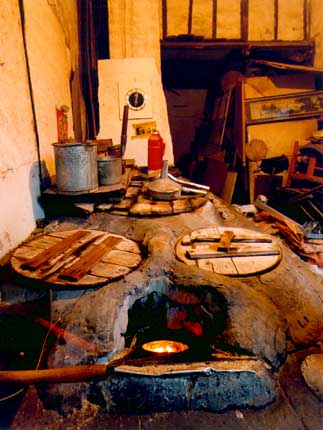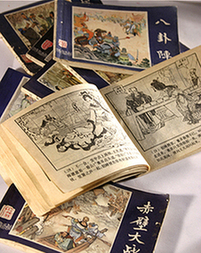Once everyone got their hot water down at the neighborhood tiger stove and phone messages from helpful (and very well-informed) ladies at the public phone booth. Nie Xin describes colorful life in the good old days.
The longtang or lane is to Shanghai as the siheyuan or four-square courtyard is to Beijing. Culturally and historically, it's a namecard for the city.
The narrow old lanes with classic shikumen (stone-gated) houses snuggled wall to wall represented a cozy, neighborly lifestyle, one that evokes nostalgia today for the good old times.
It's not only the architecture that's gone, it's the way of life, when days weren't so hectic and there was time to spare, sipping tea around the tiger stove, taking your child down to the book stall to read aloud from a picture book of "Romance of the Three Kingdoms."
Every neighborhood had a tiger stove for boiling water, public telephone booth, big brightly decorated biscuit tins, children's picture book stalls, popcorn machines and other fixtures of longtang life. Most are gone.
Laohu zao (tiger stove)
 The tiger stove was a huge communal wood and coal burning stove on which hot water was boiled for residents.
The tiger stove was a huge communal wood and coal burning stove on which hot water was boiled for residents.
It was called so because it was massive, its pipe curled like a tiger's tail and it had windows on the stove chamber shaped like tiger's eyes.
People lived without gas stoves or heaters in their houses, so they went down to the tiger stove with vacuum bottles to get the hot water they needed for cooking, making tea and bathing.
Big iron pails were always simmering on the stove top. People paid 1 fen (100 fen equal 1 yuan) for every two bottles of boiling water.
"Before we started to have gas at home, the tiger stove was one of the most important facilities in our life," says Jun Fenfen, 54.
The stove itself became an informal gathering spot, a place to keep warm in winter, a teahouse in all seasons with a few square wooden tables and benches.
"Elders liked to take tea leaves from home, have a tea, sit and chat," recalls Jun whose father was a regular customer.
Tiger stoves usually heated small public bathrooms. After 5pm, men could take showers there.
They were charming but highly polluting, filling the air with charcoal and coal dust and adding to the grime in the neighborhood.
Gongyong dianhua (public phone booth)
Without telephones at home, public telephone stops were important in daily life. These were the days when the friendly, sometimes too well-informed and gossipy, ladies at the telephone stop knew all about you.
Generally every neighborhood had a telephone stop with several solid black telephones. Today they are collectors' items, costing around 250 yuan (US$40) each.
"When somebody called in, they told us whom they wanted to talk to, gave us their address, and the number for calling back," recalls Cao Peiru, 85, who used to work in a telephone stop on Ji'an Road in Luwan District.
"We would go find them and give them the message," says Cao.
The staff were generally retired women. The salary in the 1970s was 10-15 yuan a week.
It cost 3-4 fen to make a call for 3-4 minutes.
Binggan ting (biscuit tin)
Big, brightly decorated biscuit tins were commonplace.
People bought loose cookies, crackers and biscuits and kept them in square tins. The containers were decorated with gold fish, flowers and birds, landscapes, opera characters and movie stars or singers.
Xiaoren shu (children's books)

Once upon a time, children also had time to read for fun and many a longtang had a cozy book stall that sold or rented children's picture books. Kids and their parents could also sit and read.
Xiaoren shu literally means "children's picture story book." They were children's versions of classics like "Romance of the Three Kingdoms," "Water Margin" and others.
Many adults have fond memories of the days when they could browse with their mom or dad, read in the book corner, chat with others and maybe rent a book for the week.
Those were wonderful memories.
(Shanghai Daily October 20, 2008)